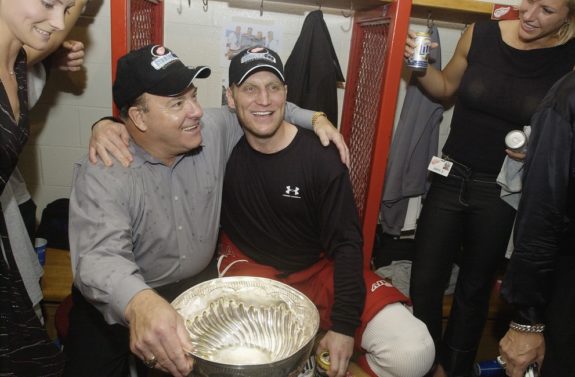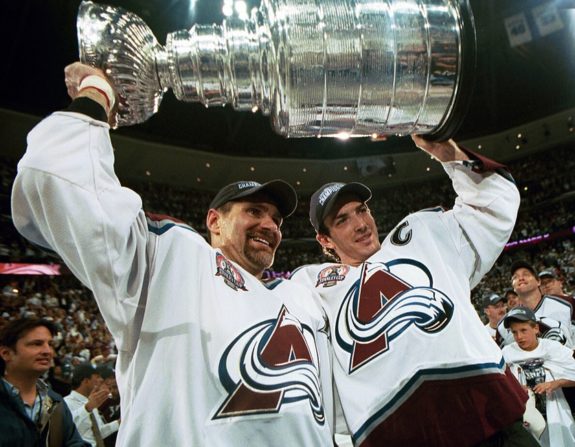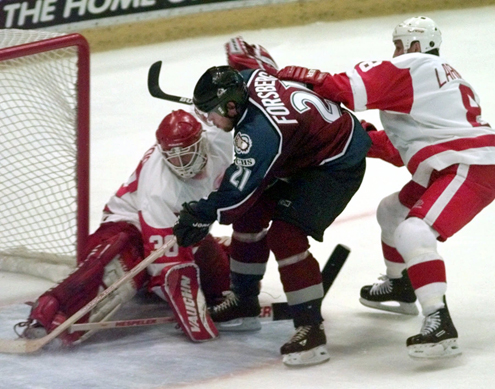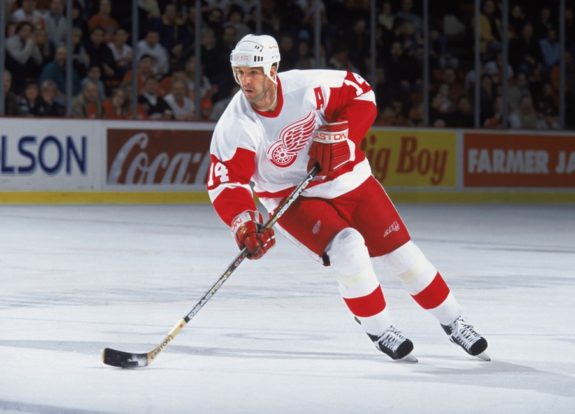A few weeks back, the Detroit Red Wings hosted a ’90s-centric theme night during a visit from the Colorado Avalanche. It was the perfect way to sprinkle some delightful nostalgia into a presumed run-of-the-mill loss at the beginning of March.
For those cognizant of those years, the throwback clips on the broadcast and in-game video board represented vivid memories. But for anybody under the age of 25, or depending on the highlight, maybe even toward the age of 30, the details might be a little less clear.
Related: Steve Yzerman, The Captain
And what about the series that ended the rivalry as we knew it once and for all? Eighteen years later now, it feels so long ago.

The Wings and Avs faced each other in the playoffs five times between 1996-2002. There were Stanley Cups won, jaws broken, vile words exchanged, revenge taken, and blood spilled. Their final meeting in the hey-day of the rivalry was a sendoff of epic proportions. It was one-sided and sudden, a dramatic knockout punch delivered by a screaming, laughing Red Wings squad who’d eventually claim their third Stanley Cup in six years, topping the two Cups won by Colorado in that seven-year span.
But before the Wings could chase Patrick Roy in a 7-0, Game 7 win at Joe Louis Arena, the Wings first had to climb out of a 3-2 series hole on the road. And that was when the embarrassment of Roy began.
Giants Colliding (Again)
Entering the 2001-02 season, Detroit and Colorado had each won two cups since 1996. That alone would be enough to stoke the flames of a rivalry, even without the frequent postseason meetings and notoriously violent nature between the two.
Related: Best #9’s in NHL History
The Avalanche won the first and then the Wings went back-to-back in 1997-98. Colorado reclaimed its place atop the hockey world in 2001, while their bitter rivals from Hockeytown were upset by the Los Angeles Kings in the opening round, 4-2, after finishing the season with 111 points.

That prompted general manager Ken Holland to bring on future Hall-of-Famers Dominik Hasek, Brett Hull and Luc Robitaille to Detroit, a trio that’d join more fellow Hall-of-Famers than can be counted on one hand.
The revamped Wings would make good on Holland’s investment, finishing with 116 points and earning the President’s Trophy. They cruised through first- and second-round matchups against the Vancouver Canucks — thanks to a little help from Dan Cloutier — and St. Louis Blues. The Avs, meanwhile, were forced through a pair of Game 7’s against the Kings and San Jose Sharks to earn a date with Detroit.
A Duel for the Ages
After Game 6 of the 2002 Western Conference Final, the New York Times would dub the series “one of the most interesting and best-contested playoff rounds in modern hockey history.” (from ‘HOCKEY; Roy’s Gaffe Helps Red Wings Force Seventh Game,’ New York Times, 05/30/2002)
If only they’d known what comes next.
A Darren McCarty hat trick got the Red Wings off on the right foot with a 5-3 win in Game 1, but Colorado took three out of the next four to head home with a 3-2 advantage. Games 2 and 3 went to overtime, setting the stage for yet another overtime in a pivotal Game 5 with the series tied 2-2. The Avalanche carried a 1-0 lead into the third period before a severely hobbled Steve Yzerman, who’d finish the playoffs with a team-high 23 points, tied things up 0:54 into the third. With just under two minutes to go, Brendan Shanahan ripped a shot off the post that would have won the game, and swung all of the series’ momentum in Detroit’s direction.
Instead, the game was won on a breakaway goal by Peter Forsberg in sudden-death overtime.
“I’ll still have nightmares about that one.”
Brendan Shanahan, ESPN
Roy’s Way
It’s worth mentioning that despite the Red Wings’ team success, they’d dropped three out of four playoff meetings between the two squads to this point. And in the most recent two (4-2, 1999; 4-1, 2000), Detroit had failed to win a game once the Avs put them on the brink of elimination.

The swift beating in 2000 even left Yzerman wondering whether his team had lost its edge.
“I guess you can say we have lost that certain something, whatever it is. … I mean, this is the second straight time that we’re out in the second round, and even though we played better this year than we did last year, the fact that we couldn’t execute when we needed to means that something went wrong.”
from ‘Over and Out: Detroit ousted in second round again with a Rocky Mountain sigh,’ Detroit Free Press, 05/06/2000
And then there was the fact that to stave off elimination in Game 6, they’d need to also beat Roy, who’d amassed a .943 save percentage (SV%) with a 1.91 goals-against average (GAA) in the two series mentioned by the Detroit captain. Roy, at age 36, was also having the best campaign of his illustrious Hall-of-Fame career, ending the 2001-02 regular season with career highs in SV% (.925) and GAA (1.94) and a second-place finish in Vezina voting.
Do or Die
So here we are. Game 6. The Pepsi Center. Denver, Colorado.
The Avalanche had scored first in every game to this point, and with the exception of Detroit’s Game-1 win, they’d all ended in a one-goal difference. Hasek was tested in the opening minutes of Game 6, coming up with huge stops on Chris Drury, Eric Messier, and Milan Hejduk in the opening three minutes to help buck the detrimental trend.
Related: 3 Biggest Trades in Red Wings History
Detroit bounced back nicely, holding Colorado without a shot for nearly a full 15 minutes — though, that doesn’t include a great chance by Forsberg that was blasted just wide of the net with about 2:30 left in the opening frame — before the Wings finally caught a break that defined the series with under a minute to go.

Colorado attempted to clear the puck after a faceoff to Roy’s left, but Fredrick Olausson was able to keep it in along the boards. The puck bounced to Sergei Fedorov, who smacked it ahead to Yzerman for a premium chance on an out-of-position Roy. The French-Canadian goaltender spun to his back, slamming his arm down on the ice to make a highlight-reel save on the Detroit captain.
Yzerman corralled the puck seconds later, after a high shot by Nicklas Lidstrom garnered a rebound opportunity. He looked for the open goal mouth, fired again. This time, Roy got it with the glove. Unbelievable.
Given the sequence prior to the save, the emotion of the series, Roy’s knack for flash, what comes next should be expected: The three-time Vezina winner raised his glove to the referee put an exclamation mark on the save. Not part of said expectations? Losing control of the puck.
Asked whether it was a good idea to add the flourish, [Roy] smiled but answered obliquely: ”I made an outstanding save on Yzerman. It was a very, very, very good save.” He paused, as if replaying the scene in his mind. ”It’s too bad,” he said softly.
New York Times
Shanahan, whose missed opportunity in Game 5 had haunted him over the previous 48 hours, didn’t miss his second chance at playoff glory. He pushed the loose puck across the goal line to take a 1-0 lead in the final minute of the opening period. Detroit would not give up another goal in the series.
And the rest, as they say, is history.